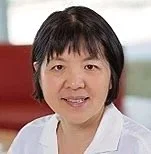
GCC REACH Cohort 1
Robert Y. T’sai, TAMU IBT
Project Summary: Medicated mucoadhesive patch as non-invasive treatment of oral precancers
We are working on developing biocompatible and biodegradable topical drug delivery platforms, whose geometry and release kinetics allow for a tunable pharmacokinetic profile for mucosal and dermal applications. Our most advanced product (LeukoPlax) is a drug-embedded mucoadhesive oral patch, formulated using an inexpensive and scalable additive manufacturing process to precisely control the pharmacology of multiple drugs for topical delivery. LeukoPlax is designed as a non-invasive treatment for oral precancerous lesions and localized oral cancer.
Fernanda Laezza, UTMB
Project Summary: Small molecule for pain medication development
Fernanda Laezza is a tenured Professor in the Department of Pharmacology & Toxicology at The University of Texas Medical Branch and is the Scientific Founder of IonTX. Inc. Her research has pioneered innovative approaches in the field of neuropharmacology, with a focus on developing precision therapies for pain and various neurological and neuropsychiatric disorders. As an alumna of the TMC/ACT program, the NIH AAP program, and the NIH eC3i commercialization program, she has gained invaluable entrepreneurial insights. She envisions that GCC-REACH will facilitate IonTXs advancement to the next level of growth and development.

Mario Escobar, Rice University
Project Summary: Biologic gene therapy for treatment of heart failure
After a heart attack, the heart loses energy, which results in the heart function being reduced and eventually leading to heart failure. This happens because there's a decrease in the number and function of energy-producing structures in the cells called mitochondria. My research focuses on the creation of genetic tools that allow us to control the number and function of mitochondria. Through my research, I expect to develop new methods to control the energy levels in the heart and ultimately create therapies to help patients with heart failure.
Jean Jiang & Johanna Webb, RiverWalk Therapeutics
Project Summary: Small molecule targeting metastatic cancers
RiverWalk is an entirely women-owned and women-led early-stage drug development company spun out from UT Health San Antonio (UTHSA) to commercialize several novel small molecule inhibitors of adenosine A2 receptor (A2A and A2B) signaling developed in the UTHSA lab of our founder, Dr. Jean Jiang. RiverWalk's novel chemical compounds are potent A2A/A2B receptor inhibitors, and they have a novel, first-in-class mechanism of action as inverse agonists. This feature provides more complete inhibition of the A2 receptors by inhibiting both adenosine-induced and spontaneous receptor signaling. Studies have established RW-108 as a potent dual A2A/A2B inhibitor and a promising new therapeutic for treating advanced TNBC. RiverWalk is participating in GCC REACH to explore the efficacy of these unique compounds in additional classes of indications with high unmet needs.
Thomas A. Kent, MD, Texas A&M Institute of Biosciences and Technology
Project Summary: Oxidized carbon nanoparticle to catalytically support biological reactions
When cells are injured, a cascade of damaging reactions magnifies the injury, overwhelming conventional therapeutics that typically address only a single mechanism. Our team has developed a new approach using a synthetic nano-sized particle, derived from an existing medication, activated charcoal, with transformed properties that mimics the catalytic (without requiring regeneration) actions of several natural enzymes impaired by these injuries. We founded a new company, Pleozyme, and our initial focus is on a rare mitochondrial disorder, targeting a faster track to commercialization through an orphan disease designation. The GCC Reach program will be of enormous benefit in guiding us to this goal.

Daniel Diaz, Intelligent Proteins, LLC.
Project Summary: ML-guided protein engineering platform to accelerate the developability of cancer biologics
Developing biologics is challenging due to immunogenic side effects and developability issues. While at UT Austin, our team has developed machine learning-guided protein engineering (MLPE) frameworks and validated its ability to predict mutations that improve developability properties and activity of numerous enzymes and antibodies. At Intelligent Proteins, LLC, we are leveraging our MLPE platform to accelerate the development of human enzymes-based therapies that target vulnerabilities in cancer metabolism. Specifically, we focus on enzymes that modulate critical metabolites in the tumor microenvironment to induce programmed cell death.
Nadia German, Texas Tech University
Project Summary: Preclinical drug development of small molecules with application in treating cancer and pain
Dr. German is a tenured associate professor at Texas Tech University HSC in the Department of Pharmaceutical Sciences. In addition, she is a scientific co-founder of Esperanza Therapeutics, Inc. Her interests are in the early stage/preclinical drug development of small molecules with application in treating TNBC cancer. The unique antineoplastic mechanism of action allows simultaneous induction of mitochondria stress in cancer cells and modulation of inflammation in the cancer microenvironment. Her second area of interest lies in the field of developing non-addictive pain therapeutics, and currently, she has two distinct classes of agents that target pain pathways.

GCC REACH Cohort 2
Chibawanye Ene, MD, MD Anderson Cancer Center
Project Summary: A macrophage-based cell therapy called MDA-iMacs that will be used to deliver T-cell activating cytokines, oncolytic viruses and antibodies to the tumor microenvironment
The development of a macrophage-based cell therapy for cancer has been impeded by inherent resistance of macrophages to stable genetic modification and limited yield associated with monocyte sources for macrophages. Our research focuses on developing strategies to produced patient specific macrophages (MDA-iMacs) at clinically relevant numbers that can be genetically modified to deliver anti-cancer agents including T-Cell activating cytokines, viruses and checkpoint antibodies. Our research is also focused on developing off the shelf donor MDA-iMacs that are readily available for use and less susceptible to immune mediated clearance following administration. We expect that our research will make macrophage-based cell therapies widely available for immunotherapy resistant cancers and non-cancer inflammatory conditions.
Aldona Spiegel, MD, Houston Methodist Hospital
Project Summary: 3D-printed soft tissue mesh that utilizes advanced materials and design to create a customized, natural breast shape tailored to each patient

Xiaotong Song, Texas A&M University
Project Summary: Metabolic reprogramming-driven CAR T cell therapy for solid tumors
The project is to develop an innovative CAR T cell therapy platform suitable for solid tumors. In solid tumors, the cancer cells use up all the nutrients for their own metabolism. As a result, T cells are starving. Human solid tumors are commonly classified as “cold tumors” with few infiltrating T cells. We were the first to identify an alternative energy source (Song et al. Nature Metabolism, 2020) and we now have designed an ingenious strategy for the T-cells to generate their own metabolic fuel allowing T cells to prosper in the tumor microenvironment (Song et al. Cell Reports Medicine, 2024). This platform technology, called MRCAR, can be used in combination with any existing T-cell therapy.
AJ Walters, Rice University
Project Summary: Metabolic reprogramming-driven CAR T cell therapy for solid tumors
AJ Walters is a bioengineer positioned at the nexus of synthetic biology, cell engineering, immunology, and cell therapy. His research in the labs of Dr. Caleb Bashor (Rice University Dept. of Bioengineering) and Dr. Scott Olson (UTHealth Houston McGovern Medical School Dept. of Pediatric Surgery) aims to make cell therapies more effective and accessible. He is working on bringing the advances in genetic engineering and synthetic biology to mesenchymal stem/stromal cell (MSC) based cell therapy with the ultimate goal of building an accessible allogeneic cell therapy that can be deployed in regenerative medicine across a wide range of inflammation disorders, starting with neuroinflammation associated with traumatic brain injury. Eventually this approach could be applied to other indications, such as cancer.

Han Xiao & Xiang Zhang, Rice University, Baylor College of Medicine
Project Summary: Bone-Targeting Drugs for inhibiting bone tumors
Han Xiao, Ph.D., Director of the SynthX Center at Rice University, and Xiang Zhang, Ph.D., Director of the Lester and Sue Smith Breast Center at Baylor College of Medicine, have collaborated extensively on targeting the bone microenvironment in metastatic cancer. Dr. Xiao pioneered antibody-bisphosphonate conjugates for treating bone metastases, while Dr. Zhang has over 12 years of experience studying bone colonization by breast cancer cells. Their joint efforts have led to the co-filing of multiple patents and the founding of OsteoLogic Therapeutics in 2022, advancing innovative therapeutic strategies in cancer research.

GCC REACH Cohort 3
Ann Killary, MD Anderson Cancer Center
Project Summary: A novel protein-based blood test for the early detection of pancreatic cancer
Joshua Gruber, UT Southwestern
Project Summary: Developing small molecule antagonists targeting the histone synthesis pathway to block cell division in high-grade cancers with cell cycle regulator mutations, such as triple-negative breast cancer and small cell lung cancer

Christoforos Thomas, Houston Methodist Research Institute
Project Summary: A thereaputic leverages its anti-metastatic activity to prevent metastasis and improve clinical outcomes in patients with aggressive breast cancer
Wenbo Li, UT Health
Project Summary: eRNA-targeting therapeutics to inhibit cancer-specific enhancer RNAs (eRNAs) that drive tumor growth, with promising early-stage results in breast cancer and glioblastoma, aiming for highly targeted cancer treatments with minimal toxicity to healthy tissues.

Todd Treangen, MD, Rice University
Project Summary: A software platform aids in the detection of previously unseen viral pathogens, helping to uncover undiagnosed illnesses

GCC REACH Cohort 4
Chibawanye Ene, MD, MD Anderson Cancer Center
Project Summary: A macrophage-based cell therapy called MDA-iMacs that will be used to deliver T-cell activating cytokines, oncolytic viruses and antibodies to the tumor microenvironment
The development of a macrophage-based cell therapy for cancer has been impeded by inherent resistance of macrophages to stable genetic modification and limited yield associated with monocyte sources for macrophages. Our research focuses on developing strategies to produced patient specific macrophages (MDA-iMacs) at clinically relevant numbers that can be genetically modified to deliver anti-cancer agents including T-Cell activating cytokines, viruses and checkpoint antibodies. Our research is also focused on developing off the shelf donor MDA-iMacs that are readily available for use and less susceptible to immune mediated clearance following administration. We expect that our research will make macrophage-based cell therapies widely available for immunotherapy resistant cancers and non-cancer inflammatory conditions.

Xiaotong Song, Texas A&M University
Project Summary: Metabolic reprogramming-driven CAR T cell therapy for solid tumors
The project is to develop an innovative CAR T cell therapy platform suitable for solid tumors. In solid tumors, the cancer cells use up all the nutrients for their own metabolism. As a result, T cells are starving. Human solid tumors are commonly classified as “cold tumors” with few infiltrating T cells. We were the first to identify an alternative energy source (Song et al. Nature Metabolism, 2020) and we now have designed an ingenious strategy for the T-cells to generate their own metabolic fuel allowing T cells to prosper in the tumor microenvironment (Song et al. Cell Reports Medicine, 2024). This platform technology, called MRCAR, can be used in combination with any existing T-cell therapy.

GCC REACH Cohort 5
Chibawanye Ene, MD, MD Anderson Cancer Center
Project Summary: A macrophage-based cell therapy called MDA-iMacs that will be used to deliver T-cell activating cytokines, oncolytic viruses and antibodies to the tumor microenvironment
The development of a macrophage-based cell therapy for cancer has been impeded by inherent resistance of macrophages to stable genetic modification and limited yield associated with monocyte sources for macrophages. Our research focuses on developing strategies to produced patient specific macrophages (MDA-iMacs) at clinically relevant numbers that can be genetically modified to deliver anti-cancer agents including T-Cell activating cytokines, viruses and checkpoint antibodies. Our research is also focused on developing off the shelf donor MDA-iMacs that are readily available for use and less susceptible to immune mediated clearance following administration. We expect that our research will make macrophage-based cell therapies widely available for immunotherapy resistant cancers and non-cancer inflammatory conditions.

Todd Treangen, MD, Rice University
Project Summary: A software platform aids in the detection of previously unseen viral pathogens, helping to uncover undiagnosed illnesses
Wenbo Li, UT Health
Project Summary: eRNA-targeting therapeutics to inhibit cancer-specific enhancer RNAs (eRNAs) that drive tumor growth, with promising early-stage results in breast cancer and glioblastoma, aiming for highly targeted cancer treatments with minimal toxicity to healthy tissues.

Christoforos Thomas, Houston Methodist Research Institute
Project Summary: A thereaputic leverages its anti-metastatic activity to prevent metastasis and improve clinical outcomes in patients with aggressive breast cancer

























